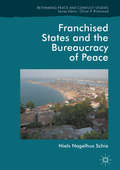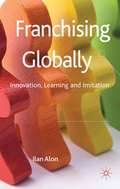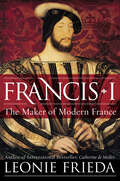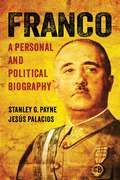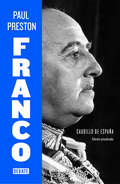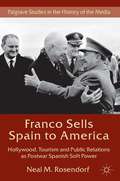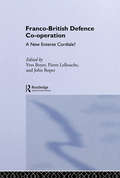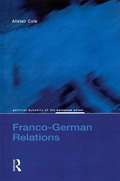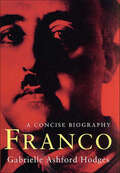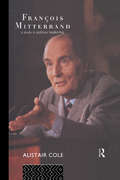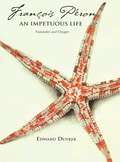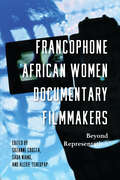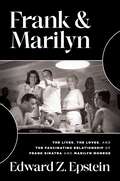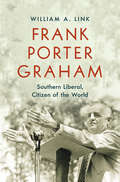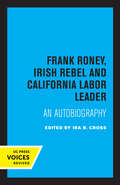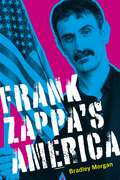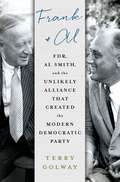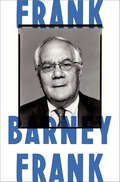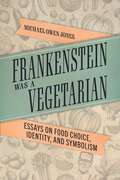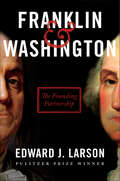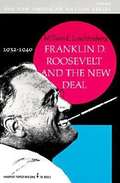- Table View
- List View
Franchised States and the Bureaucracy of Peace (Rethinking Peace and Conflict Studies)
by Niels Nagelhus SchiaThis book examines a new type of state formation evoked by the rise of transnational rule, what Schia calls franchised states. Drawing on anthropological studying-through fieldwork within the UN organization, he demonstrates how peacebuilding activities turned Liberia into an object of governing, whereby the UN, in seeking to build the state, also became the state. The sovereign state of Liberia here emerges as a franchise rather than a self-contained entity. Two implications follow: First, that international peacebuilding turns post-conflict countries into clients of the international community. Second, that "sovereignty" is no longer exclusively associated with the state: it is organized in and through specific practices of governing where a state actor is only one among a range of actors. With these findings, the book moves beyond previous work on peacebuilding by focusing on the unbundling of sovereignty. It contributes to the literature on the changing forms of sovereignty by showing the specific ways in which sovereignty is organized, packaged and enacted, often by actors working under international auspices. This book will be of interest to practitioners and students interested in international organizations, international relations, the study of international practices, UN, and peacebuilding.
Franchising Globally
by Ilan AlonFranchising Globally is first of its kind to examine franchising both from an entrepreneurial and from an international perspective. The book includes theoretical discussions and practical examples of international franchising as well as both micro and macro studies of franchising environments in different parts of the world.
Francis I: The Maker of Modern France
by Leonie FriedaFrancis I (1494-1547) was inconstant, amorous, hot-headed and flawed. Arguably he was also the most significant king that France ever had. A contemporary of Henry VIII of England, Francis saw himself as the first Renaissance king. A courageous and heroic warrior, he was also a keen aesthete, an accomplished diplomat and an energetic ruler who turned his country into a force to be reckoned with. Bestselling historian Leonie Frieda's comprehensive and sympathetic account explores the life of the most human of all Renaissance monarchs - and the most enigmatic.
Francis I: The Maker of Modern France
by Leonie FriedaFrancis I (1494-1547) was inconstant, amorous, hot-headed and flawed. Arguably he was also the most significant king that France ever had. A contemporary of Henry VIII of England, Francis saw himself as the first Renaissance king. A courageous and heroic warrior, he was also a keen aesthete, an accomplished diplomat and an energetic ruler who turned his country into a force to be reckoned with. Bestselling historian Leonie Frieda's comprehensive and sympathetic account explores the life of the most human of all Renaissance monarchs - and the most enigmatic.
Francis I: The Maker of Modern France
by Leonie FriedaFrancis I (1494-1547) was inconstant, amorous, hot-headed and flawed. Yet he was also arguably the most significant king that France ever had. This is his story. A contemporary of Henry VIII of England, Francis saw himself as the first Renaissance king, a man who was the exemplar of courtly and civilised behaviour throughout Europe. A courageous and heroic warrior, he was also a keen aesthete, an accomplished diplomat and an energetic ruler who turned his country into a force to be reckoned with. Yet he was also capricious, vain and arrogant, taking hugely unnecessary risks, at least one of which nearly resulted in the end of his kingdom. His great feud with his nemesis Charles V, the Holy Roman Emperor, defined European diplomacy and sovereignty, but his notorious alliance with the great Ottoman ruler Suleiman the Magnificent threatened to destroy everything. With access to never-before-seen private archives, Leonie Frieda's comprehensive and sympathetic account explores the life of the most human of all Renaissance monarchs - and the most enigmatic.Read by Carole Boyd(p) Orion Publishing Group 2018
Francis I: The Maker of Modern France
by Leonie FriedaLeonie Frieda, the bestselling author of Catherine de Medici, returns to sixteenth-century Europe in the evocative and entertaining biography, Francis I.Catherine de Medici’s father-in-law, King Francis of France, was the perfect Renaissance knight, the movement’s exemplar and its Gallic interpreter. An aesthete, diplomat par excellence, and contemporary of Machiavelli, Francis was the founder of modern France, whose sheer force of will and personality molded his kingdom into the first European superpower. Arguably the man who introduced the Renaissance to France, Francis was also the prototype Frenchman—a national identity was modeled on his character. So great was his stamp, that few countries even now are quite so robustly patriotic as is France. Yet as Leonie Frieda reveals, Francis did not always live up to his ideal; a man of grand passions and vision, he was also a flawed husband, father, lover, and king.With access to private archives previously unused in a study of Francis I, Frieda recreates a remarkable era of French history to explore the life of a man who was the most human of the monarchs of the period—and yet, remains the most elusive.“Superb and vivid . . . brings the world of Francis I to life, skillfully delineating the moves and major players in both European and domestic politics . . . and also gives the reader wonderful glimpses of the often licentious court life of that time . . . Frieda suggests that, under Francis I, France preserved its political power, greatly increased its cultural influence, and positioned itself for the Grand Siecle that his Bourbon successors would soon preside over.” —Wall Street Journal
Franco
by Stanley G. Payne Jesús PalaciosThe history of modern Spain is dominated by the figure of Francisco Franco, who presided over one of the longest authoritarian regimes of the twentieth century. Between 1936 and the end of the regime in 1975, Franco's Spain passed through several distinct phases of political, institutional, and economic development, moving from the original semi-fascist regime of 1936-45 to become the Catholic corporatist "organic democracy" under the monarchy from 1945 to 1957. Distinguished historian Stanley G. Payne offers deep insight into the career of this complex and formidable figure and the enormous changes that shaped Spanish history during his regime.
Franco (edición actualizada): Caudillo de España
by Paul PrestonLa publicación de esta edición revisada y actualizada de la biografía de Franco de Paul Preston, a los cuarenta años de la muerte del dictador, es un acontecimiento, no en vano sigue siendo considerada unánimemente como la obra de referencia. Contra la visión de Franco como figura providencial, una biografía completísima, rigurosa y apasionante del hombre que rigió España durante tantos años, donde se muestra al militar ambicioso e implacable, al admirador de Hitler y Mussolini; al dirigente político cada vez más pagado de su propio papel, pero incapaz de comprender la complejidad de Estado y la economía modernas. Queda el hombre visceralmente conservador, tan cauto como ambicioso, hábil en el manejo de las personas y de los contrapesos del poder. Un libro imprescindible para quien quiera comprender la historia reciente de España, así como a uno de los personajes centrales de la misma. La crítica ha dicho...«Paul Preston ha escrito, y con gran diferencia, la mejor biografía del dictador Franco.»L.M. Anson «La biografía definitiva y apasionante del dictador español Francisco Franco.»Publishers Weekly «Preston nos presenta un retrato de Franco muy diferente al que generalmente conocemos.»Kirkus Review
Franco Sells Spain to America
by Neal M. RosendorfA groundbreaking study of the Franco regime's utilization of Hollywood film production in Spain, American tourism, and sophisticated public relations programs - including the most popular national pavilion at the 1964-65 New York World's Fair - in a determined effort to remake the Spanish dictatorship's post-World War II reputation in the US.
Franco-British Defence Co-operation: A New Entente Cordiale?
by John Roper Yves Boyer Pierre LelloucheThis book focuses on the prospects now opening up for Franco-British co-operation in the fields of defence and security. Looking at the situation from the viewpoints of both Britain and France, it builds on the indications of a developing awareness within the two governments of the benefits to be derived from a closer partnership. The book argues forcefully that it is now time for both Britain and France to give up their long-standing attitude of mutual indifference or even rivalry, and to recognise openly the similarities and natural affinities that exist between them. Although the ways in which defence problems are discussed in the two countries do not always coincide, the solutions proposed are often alike: in other words, Paris and London have much more in common in their approaches to defence and security questions than is generally recognised. The solutions put forward are intended not only to increase co-operation between France and Britain, but also to lead to greater political and military cohesion among all the West European allies.
Franco-German Relations (Political Dynamics of the European Union)
by Alistair ColeSuitable for use as a core text in courses of comparative European politics or in departments of Politics. Can also be used for courses that explore the Political Dynamics of the European Union.Franco-German relations lie at the heart of European integration and are central to an understanding of major issues like monetary union and foreign policy. Based on extensive research, this concise text contains a multi-level analysis of this key topic. Describing historical background and examining contemporary debates, it considers the domestic settings of French and German politics; the internal operation of the Franco-German relationship itself; and the impact of the relationship in the wider European context. Cole provides students with a much-needed accessible introduction, and framework for theoretical analysis.
Franco-German Relations Seen from Abroad: Post-war Reconciliation in International Perspectives (Frontiers in International Relations)
by Nicole Colin Claire DemesmayThis book examines external perceptions of the Franco-German relationship, both from a historical perspective and as a driving force for regional integration. By providing various country and regional studies, it analyses the various types of perception and self-perception in several regions around the globe. Here, Franco-German cooperation serves as a mirror in which third-party countries view their own situation, today and in the future. The contributions address the questions of if and how the Franco-German reconciliation and cooperation is perceived as a role model for other regions, especially for the reconciliation of other inter-state and international conflicts. A concluding chapter highlights the divergences and convergences between the respective conflicts, and proposes recommendations for actors involved in diplomacy and international relations.The book is intended to provide scientific support for the implementation of the Franco-German Aachen Treaty of January 2019. It will appeal to scholars in political science and cultural studies, and to anyone interested in learning more about the Franco-German relationship and on external perspectives on it.
Franco: A Concise Biography
by Gabrielle Ashford HodgesGeneral Francisco Franco came to prominence during the days of David Lloyd George and Woodrow Wilson and was able to cling to absolute political power until his death in 1975. Over his fifty-year career, he became one of the four dictators who changed the face of Europe during the twentieth century.Franco joined the Spanish Army when he was barely fifteen years old. In 1926 he became the youngest general in Europe and, driven by an astonishing sense of his own greatness, was recognized as sole military commander of the Nationalist zone during the Spanish Civil War. His ambition was always to hold on to the power that he had secured. In practice, this meant winning the Spanish Civil War and surviving the fall of the fascist regimes of Hitler and Mussolini and the international isolation that followed their defeat.But behind the military heroics and dexterous political footwork lay an insecure and vengeful man, wracked by contradictory impulses. Although fueled by a single-minded determination to succeed, he was full of self-doubt. A bold and sometimes inspirational soldier in Africa, he became an indecisive, hesitant military commander during the Civil War. Filled with a burning conviction that his destiny was bound up with the medieval kings of Spain and God Himself, he appeared shy, withdrawn, and humble. Ruthlessly intent on wiping out all political opposition, he denied heatedly that he was a dictator. A stubborn man, he could be remarkably flexible when it came to safeguarding his power.Gabrielle Ashford Hodges' psychological biography considers Franco's mental state, as well as his political motivation. In doing so, it succeeds admirably in getting under the skin of Europe's most enduring dictator.
Francois Mitterrand: A Study in Political Leadership
by Alistair ColeFrancois Mitterrand is one of France's most famous twentieth-century politicians, yet interpretations of his values and leadership vary widely.Alistair Cole's in depth study starts with a chronological overview of Mitterrand's career, and proceeds with a policy-based assessment of Mitterrand's presidency. By evaluating Mitterrand's policies in relation to various key roles such as the party leader, the President, the dispenser of patronage, the European statesman and the World Leader, this book places his leadership in comparative perspective, and offers a new understanding of him as an individual political leader. This fully up dated paperback edition will be invaluable for students of contemporary European politics as well as those interested in the career of one of post-war Europe's leading statesmen.
Francois Peron: An Impetuous Life
by Edward DuykerIn 1800 François Péron, an ambitious young medical student not long released from the French revolutionary army, gained a place as an assistant zoologist on Nicolas Baudin's expedition to Australian waters. As his colleagues either deserted or died, he would rise rapidly within the expedition's ranks and even write its official account. In doing so, Péron would seek to destroy Baudin's posthumous reputation. The expedition was famously marked by the vexed relationship between Péron and Baudin, but Péron's work, as a man of science, profoundly enhanced the achievements of the expedition: he seized valuable opportunities to pioneer zoological, oceanographic and ethnographic studies, and as an ecological observer was remarkably prescient. Edward Duyker's meticulously researched biography of Péron takes readers on an engaging and wide-ranging journey—from the heart of pre-revolutionary rural France, to the bitter fighting on the Rhineland front in 1793-94, to the late eighteenth-century Paris medical school, to landfalls in the Atlantic and the Indian Oceans, to the little-known shores of Van Diemen's Land and New Holland, and back into the very heart of Napoleon's Empire. This is both a balanced assessment of the difficult relationship between Péron and Baudin, and an analysis of the conduct of science during some of the most turbulent years in French history.
Francophone African Women Documentary Filmmakers: Beyond Representation (Studies in the Cinema of the Black Diaspora)
by Florence Martin Melissa Thackway Sheila Petty El Hadji Diop Felix Veilleux Suzanne Gauch Herve TchumkamFrancophone African Women Documentary Filmmakers is groundbreaking edited collection which explores the contributions of Francophone African women to the field of documentary filmmaking. Rich in its scope and critical vision it constitutes a timely contribution to cutting-edge scholarly debates on African cinemas. Featuring 10 chapters from prominent film scholars, it explores the distinctive documentary work and contributions of Francophone African women filmmakers since the 1960s. It focuses documentaries by North African and Sub-Saharan women filmmakers, including the pioneering work of Safi Faye in Kaddu Beykat, Rama Thiaw's The Revolution Will Not be Televised, Katy Lena Ndiaye's Le Cercle des noyes and En attendant les hommes, Dalila Ennadre's Fama: Heroism Without Glory and Leila Kitani's Nos lieux interdits. Shunned from costly fictional- 35mm-filmmaking, Francophone African Women Documentary Filmmakers examines how these women engaged and experimented with documentary filmmaking in personal, evocative ways that countered the officially sanctioned, nationalist practice of show and teach/promote.
Frank & Marilyn: The Lives, the Loves, and the Fascinating Relationship of Frank Sinatra and Marilyn Monroe
by Edward Z. EpsteinFrank Sinatra! Marilyn Monroe! Never before teamed in a book, yet theirs was a seven-year friendship and on-and-off intimate relationship shrouded in secrecy and fraught with danger.Frank Sinatra and Marilyn Monroe—here is the first book to bring these two all-American icons together. Their friendship and on-and-off intimate relationship, kept secret because of powerful others in their lives, spanned seven tumultuous years. At one point, he even proposed marriage. In Frank & Marilyn, we follow Sinatra and Monroe from one explosive relationship to another, their marriages and love affairs eventually leading to a tangled relationship with each other, sparking a nasty rivalry between Frank and Marilyn&’s ex-husband (and one-time friend of Frank), Joe DiMaggio. Frank and Marilyn&’s ultimately disastrous relationship with John F. Kennedy, his brother Robert, and their often ruthless family was a fatal move for Marilyn. Her death remains a controversial topic to the present day. Dedicated biographer and entertainment world insider Edward Z. Epstein has spoken with many people who were familiar with the pair, all of whom talked about the Frank and Marilyn they knew—and the dangers they faced. It&’s a fascinating, largely untold story that&’s usually glossed over…until now.
Frank Porter Graham: Southern Liberal, Citizen of the World
by William A. LinkFrank Porter Graham (1886–1972) was one of the most consequential white southerners of the twentieth century. Born in Fayetteville and raised in Charlotte, Graham became an active and popular student leader at the University of North Carolina. After earning a graduate degree from Columbia University and serving as a marine during World War I, he taught history at UNC, and in 1930, he became the university's fifteenth president. Affectionately known as "Dr. Frank," Graham spent two decades overseeing UNC's development into a world-class public institution. But he regularly faced controversy, especially as he was increasingly drawn into national leadership on matters such as intellectual freedom and the rights of workers. As a southern liberal, Graham became a prominent New Dealer and negotiator and briefly a U.S. senator. Graham's reputation for problem solving through compromise led him into service under several presidents as a United Nations mediator, and he was outspoken as a white southerner regarding civil rights. Brimming with fresh insights, this definitive biography reveals how a personally modest public servant took his place on the national and world stage and, along the way, helped transform North Carolina.
Frank Roney, Irish Rebel and California Labor Leader: An Autobiography
by Ira B. CrossThis title is part of UC Press's Voices Revived program, which commemorates University of California Press’s mission to seek out and cultivate the brightest minds and give them voice, reach, and impact. Drawing on a backlist dating to 1893, Voices Revived makes high-quality, peer-reviewed scholarship accessible once again using print-on-demand technology. This title was originally published in 1931.
Frank Zappa's America
by Bradley MorganFrom his early albums with the Mothers of Invention, Frank Zappa established a reputation as a musical genius who pushed the limits of culture throughout the 1960s and 1970s, experimenting with a blend of genres in innovative and unheard-of ways. Not only did his exploratory styles challenge the expectations of what popular music could sound like, but his prolific creative endeavors also shaped how audiences thought about the freedom of artistic expression. In Frank Zappa’s America, Bradley Morgan casts the artist as an often-misunderstood figure who critiqued the actions of religious and political groups promoting a predominantly white, Christian vision of the United States. A controversial and provocative satirist, often criticized for the shocking subject matter of his songs, Zappa provided social commentary throughout his career that spoke truth to power about the nefarious institutions operating in the lives of everyday Americans. Beginning in the late 1970s, his music frequently addressed the rise of extremist religious influence in American politics, specifically white Christian nationalism. Despite commercial and critical pressure, Zappa refused to waver in his support for free speech during the era of Reagan and MTV, including his pointed testimony before the U.S. Senate at the Parents Music Resource Center (PMRC) hearings. Throughout the 1980s, and until his death in 1993, Zappa crafted his art form to advocate for political engagement, the security of individual liberties, and the advancement of education. Music became his platform to convey progressive views promoting the rights of marginalized communities most at risk in a society governed by the principles of what he perceived as Christian radicalism. Frank Zappa’s America examines the musician’s messaging through song, tracing the means by which Zappa created passionate, at times troubling, art that combats conservativism in its many manifestations. For readers in the twenty-first century, his music and public advocacy demonstrate the need to preserve democracy and the voices that uphold it.
Frank and Al: FDR, Al Smith, and the Unlikely Alliance That Created the Modern Democratic Party
by Terry Golway"This is history told the old-fashioned way. The book is only as long as it needs to be, the adroit narrative full of heroes (Smith, Roosevelt, big-city Democratic bosses) and villains (William Randolph Hearst, William Jennings Bryan, the Ku Klux Klan). The scenes are vivid and the anecdotes plentiful." —The Wall Street Journal"Frank & Al is the latest of Mr. Golway’s several captivating books on New York politics. He delivers once again, with a timely narrative on the centennial of Smith’s first election as governor." —The New York Times "The tangled, tragic story of Al Smith and Franklin Roosevelt is one of the great tales of American politics, and Terry Golway has told it beautifully. This is a joyous book... an especially important book now." —Joe Klein"I highly recommend this fascinating and enlightening book." —Franklin D. Roosevelt, III"Beautifully written...The book is must reading for anyone interested in the history of American politics and the rise of the country’s welfare state." —Robert Dallek, author of An Unfinished Life: John F. Kennedy, 1917-1963“A marvelous portrait... Highly recommend!” —Douglas Brinkley, author of Rightful Heritage: Franklin D. Roosevelt and the Land of AmericaThe inspiring story of an unlikely political partnership—between a to-the-manor-born Protestant and a Lower East Side Catholic—that transformed the Democratic Party and led to the New DealIn the late 19th and early 20th centuries, the Democratic Party was bitterly split between its urban machines—representing Catholics and Jews, ironworkers and seamstresses, from the tenements of the northeast and Midwest—and its populists and patricians, rooted in the soil and the Scriptures, enforcers of cultural, political, and religious norms. The chasm between the two factions seemed unbridgeable. But just before the Roaring Twenties, Al Smith, a proud son of the Tammany Hall political machine, and Franklin Roosevelt, a country squire, formed an unlikely alliance that transformed the Democratic Party. Smith and FDR dominated politics in the most-powerful state in the union for a quarter-century, and in 1932 they ran against each other for the Democratic presidential nomination, setting off one of the great feuds in American history. The relationship between Smith and Roosevelt, portrayed in Terry Golway's Frank and Al, is one of the most dramatic untold stories of early 20th Century American politics. It was Roosevelt who said once that everything he sought to do in the New Deal had been done in New York under Al Smith when he was governor in the 1920s. It was Smith who persuaded a reluctant Roosevelt to run for governor in 1928, setting the stage for FDR’s dramatic comeback after contracting polio in 1921. They took their party, and American politics, out of the 19th Century and created a place in civic life for the New America of the 20th Century.
Frank: A Life In Politics From The Great Society To Same-sex Marriage
by Barney FrankHow did a disheveled, intellectually combative gay Jew with a thick accent become one of the most effective (and funniest) politicians of our time?Growing up in Bayonne, New Jersey, the fourteen-year-old Barney Frank made two vital discoveries about himself: he was attracted to government, and to men. He resolved to make a career out of the first attraction and to keep the second a secret. Now, fifty years later, his sexual orientation is widely accepted, while his belief in government is embattled. Frank: A Life in Politics from the Great Society to Same-Sex Marriage is one man's account of the country's transformation—and the tale of a truly momentous career. Many Americans recall Frank's lacerating wit, whether it was directed at the Clinton impeachment ("What did the president touch, and when did he touch it?") or the pro-life movement (some people believe "life begins at conception and ends at birth"). But the contours of his private and public lives are less well-known. For more than four decades, he was at the center of the struggle for personal freedom and economic fairness. From the battle over AIDS funding in the 1980s to the debates over "big government" during the Clinton years to the 2008 financial crisis, the congressman from Massachusetts played a key role. In 2010, he coauthored the most far-reaching and controversial Wall Street reform bill since the era of the Great Depression, and helped bring about the repeal of Don't Ask, Don't Tell. In this feisty and often moving memoir, Frank candidly discusses the satisfactions, fears, and grudges that come with elected office. He recalls the emotional toll of living in the closet and how his public crusade against homophobia conflicted with his private accommodation of it. He discusses his painful quarrels with allies; his friendships with public figures, from Tip O'Neill to Sonny Bono; and how he found love with his husband, Jim Ready, becoming the first sitting member of Congress to enter a same-sex marriage. He also demonstrates how he used his rhetorical skills to expose his opponents' hypocrisies and delusions. Through it all, he expertly analyzes the gifts a successful politician must bring to the job, and how even Congress can be made to work. Frank is the story of an extraordinary political life, an original argument for how to rebuild trust in government, and a guide to how political change really happens—composed by a master of the art.
Frankenstein Was a Vegetarian: Essays on Food Choice, Identity, and Symbolism
by Michael Owen JonesIn Frankenstein Was a Vegetarian: Essays on Food Choice, Identity, and Symbolism, Michael Owen Jones tackles topics often overlooked in foodways. At the outset he notes it was Victor Frankenstein’s “daemon” in Mary Shelley’s novel that advocated vegetarianism, not the scientist whose name has long been attributed to his creature. Jones explains how we communicate through what we eat, the connection between food choice and who we are or want to appear to be, the ways that many of us self-medicate moods with foods, and the nature of disgust. He presents fascinating case studies of religious bigotry and political machinations triggered by rumored bans on pork, the last meal requests of prisoners about to be executed, and the Utopian vision of Percy Bysshe Shelley, one of England’s greatest poets, that was based on a vegetable diet like the creature’s meals in Frankenstein.Jones also scrutinizes how food is used and abused on the campaign trail, how gender issues arise when food meets politics, and how eating preferences reflect the personalities and values of politicians, one of whom was elected president and then impeached twice. Throughout the book, Jones deals with food as symbol as well as analyzes the link between food choice and multiple identities. Aesthetics, morality, and politics likewise loom large in his inquiries. In the final two chapters, Jones applies these concepts to overhauling penal policies and practices that make food part of the pains of imprisonment, and looks at transforming the counseling of diabetes patients, who number in the millions.
Franklin & Washington: The Founding Partnership
by Edward J. Larson"Larson's elegantly written dual biography reveals that the partnership of Franklin and Washington was indispensable to the success of the Revolution." —Gordon S. Wood From the Pulitzer Prize-winning historian comes a masterful, first-of-its-kind dual biography of Benjamin Franklin and George Washington, illuminating their partnership's enduring importance. NATIONAL BESTSELLER • One of Washington Post's "10 Books to Read in February" • One of USA Today’s “Must-Read Books" of Winter 2020 • One of Publishers Weekly's "Top Ten" Spring 2020 Memoirs/BiographiesTheirs was a three-decade-long bond that, more than any other pairing, would forge the United States. Vastly different men, Benjamin Franklin—an abolitionist freethinker from the urban north—and George Washington—a slaveholding general from the agrarian south—were the indispensable authors of American independence and the two key partners in the attempt to craft a more perfect union at the Constitutional Convention, held in Franklin’s Philadelphia and presided over by Washington. And yet their teamwork has been little remarked upon in the centuries since.Illuminating Franklin and Washington’s relationship with striking new detail and energy, Pulitzer Prize–winning historian Edward J. Larson shows that theirs was truly an intimate working friendship that amplified the talents of each for collective advancement of the American project.After long supporting British rule, both Franklin and Washington became key early proponents of independence. Their friendship gained historical significance during the American Revolution, when Franklin led America’s diplomatic mission in Europe (securing money and an alliance with France) and Washington commanded the Continental Army. Victory required both of these efforts to succeed, and success, in turn, required their mutual coordination and cooperation. In the 1780s, the two sought to strengthen the union, leading to the framing and ratification of the Constitution, the founding document that bears their stamp.Franklin and Washington—the two most revered figures in the early republic—staked their lives and fortunes on the American experiment in liberty and were committed to its preservation. Today the United States is the world’s great superpower, and yet we also wrestle with the government Franklin and Washington created more than two centuries ago—the power of the executive branch, the principle of checks and balances, the electoral college—as well as the wounds of their compromise over slavery. Now, as the founding institutions appear under new stress, it is time to understand their origins through the fresh lens of Larson’s Franklin & Washington, a major addition to the literature of the founding era.
Franklin D Roosevelt and the New Deal 1932 -1940
by William E. LeuchtenburgWhen the stability of American life was threatened by the Great Depression, the decisive and visionary policy contained in FDR's New Deal offered America a way forward. In this groundbreaking work, William E. Leuchtenburg traces the evolution of what was both the most controversial and effective socioeconomic initiative ever undertaken in the United States -- "and explains how the social fabric of American life was forever altered. It offers illuminating lessons on the challenges of economic transformation -- "for our time and for all time.
